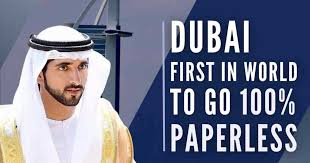Now Reading: Can Dubai Truly Go 100% Paperless by 2030? Bold Plans Ahead!
-
01
Can Dubai Truly Go 100% Paperless by 2030? Bold Plans Ahead!
Can Dubai Truly Go 100% Paperless by 2030? Bold Plans Ahead!

Table of Contents
Dubai, a city famous for its skyscrapers, luxury, and technological progress, is now dreaming of a new future: a completely paperless government and society by 2030. This bold vision, part of the Dubai Paperless Strategy, aims to remove the need for paper in every government office, public service, and business. But is this big dream truly possible? Let’s dive deeper into what this means for the UAE, the challenges ahead, and the steps already taken.
What is the Dubai Paperless Strategy?

In 2018, His Highness Sheikh Hamdan bin Mohammed bin Rashid Al Maktoum, Crown Prince of Dubai, launched the Dubai Paperless Strategy. The plan promises to make all government services fully digital by 2030, which means no more printing papers, forms, or bills.
As part of this strategy:
- 45 government entities were targeted.
- More than 1,800 digital services were created.
- Over 10,500 key transactions were moved online.
The result? Dubai claims that 336 million papers were saved between 2018 and 2021. This equals around 14,000 trees saved and 1.3 billion AED in savings — along with more than 14 million work hours reduced.
This success has made Dubai the first government in the world to go 100% paperless in its internal operations by 2021 — a full nine years ahead of its 2030 deadline.
Why Go Paperless?

Dubai’s strategy is not just about technology — it’s also about the environment, economy, and efficiency.
- Environmentally Friendly:
Paper production destroys forests and consumes water and energy. By removing paper, Dubai saves trees, reduces carbon emissions, and fights climate change. - Cost Savings:
Printing, storing, and managing paper documents is expensive. Digital systems cut these costs sharply. - Speed and Convenience:
Citizens and businesses enjoy faster services with fewer delays. A paperless system also allows 24/7 access to government services. - Innovation Leadership:
Dubai wants to become a global leader in digital government. A paperless system shows the world that Dubai is serious about the future.
Is 100% Paperless UAE Possible by 2030?

While Dubai’s government has already gone paperless internally, the bigger challenge is to make the entire UAE — including private businesses and everyday life — 100% paper-free by 2030.
Possible? Yes — but with challenges.
- Private Sector Readiness:
Many companies still depend on paper for invoices, records, and contracts. While larger businesses are turning digital fast, small and medium enterprises (SMEs) may struggle with costs and training. - Legal and Cultural Barriers:
Some contracts and official documents are still required by law to be on paper. Changing these laws — and changing public habits — will take time. - Digital Security Risks:
A fully digital system requires strong cybersecurity. Data leaks or hacking attempts could threaten public trust in the system. - Digital Divide:
Not every person in the UAE — especially older citizens or low-income workers — is comfortable using digital platforms. Special efforts will be needed to train, educate, and support these groups.
Steps Already Taken
Dubai and the UAE are not starting from zero. Major steps already show progress:
- UAE Pass: A digital identity app used for signing documents and accessing services securely online.
- DubaiNow App: Offers more than 120 city services — including bill payments, visa renewals, and health appointments — all from one platform.
- Blockchain Projects: Dubai plans to store all government documents on blockchain technology by 2030 — making paperwork unnecessary.
- Smart Dubai Office: This department is leading the digital transformation, making sure every new government service is “digital-first”.
What Experts Say
According to His Excellency Hamad Al Mansoori, Director-General of Digital Dubai, “Dubai is not only reducing paper use; it is setting a new standard for how smart cities of the future should work.”
Technology experts agree that the vision is possible, but only if:
- The government enforces new digital laws.
- Cybersecurity is kept tight.
- Businesses and people across the UAE join the paperless shift.
What Does It Mean for Citizens?
For the average person living in Dubai or the UAE, this means:
- No more carrying paper IDs, car registrations, or utility bills.
- Faster visa and license processing online.
- Easier government service access via mobile apps.
- More security for private information — if systems remain protected.
However, some worry about data privacy, digital scams, and whether elderly or non-tech-savvy people may struggle with the shift.
Conclusion: A Bold Vision with Big Promise
Can the UAE really eliminate paper by 2030?
Yes — but the road is not simple. Dubai has proven that government offices can be paperless. But to turn the entire country into a paper-free society, laws must change, businesses must adapt, and every citizen must be ready for a digital life.
If these steps succeed, the UAE could become the world’s first truly paperless nation — a model for other countries to follow.
For now, the journey continues, with 2030 as the ultimate deadline.
Read More:- Shobha Realty Launches Its Most Luxurious Project Yet—Full Details Inside 2025





















